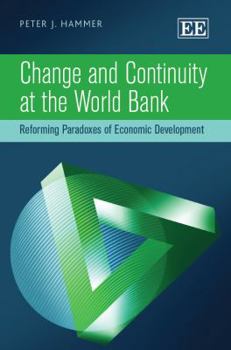Change and Continuity at the World Bank: Reforming Paradoxes of Economic Development
This fascinating book examines the World Bank's capacity for change, illustrating the influence of overlapping political, organizational and epistemic constraints. Through comprehensive historical and economic analysis, Peter J. Hammer illuminates the difficulties faced by recent attempts at reform and demonstrates the ways in which the training and socialization of Bank economists work to define the policy space available for meaningful change.
Format:Hardcover
Language:English
ISBN:1781009260
ISBN13:9781781009260
Release Date:September 2013
Publisher:Edward Elgar Publishing
Length:200 Pages
Weight:1.00 lbs.
Dimensions:9.3" x 0.6" x 6.3"
Customer Reviews
0 rating





